Lex Fridman, Bjorn Lomborg and Me
A deep dive on climate and sustainability challenges and choices with a "skeptical environmentalist," a reality-focused journalist and AI and podcasting powerhouse
Bite-size excerpts from an epic four-hour climate conversation
Lex Fridman, the popular podcaster and MIT researcher working on applying artificial intelligence in autonomous vehicles, human-robot interactions and more, recently invited me to join a conversation on global warming science and policy and other sustainability issues with Bjorn Lomborg, the Danish political scientist who is the bestselling author of False Alarm, The Skeptical Environmentalist and other provocations and president of the Copenhagen Consensus Center consultancy.
A lot of social media commentators were disappointed in two things - the lack of debate despite that label, and the lack of a climate scientist in the discussion.
I replied that the “Debate” label in the show artwork was more an unfortunate promotional provocation than a description.
I really appreciate how Fridman works to reveal realities, differences and common ground on important issues through patient conversation, avoiding the trap of win-lose debate that is an awful fit for complex challenges.
A debate is the last thing that’s needed to clarify pathways to impact cutting climate risk now and heat-trapping emissions for the long haul.
And I rejected assertions that any discussion of climate policy needs to include a climate scientist. For one thing, outside a flat-Earth fringe, there are no serious arguments about the basic climate science pointing to centuries of disruptive change ahead if greenhouse gas concentrations in the atmosphere are not stabilized. Doing so requires both an end to emissions and hard work on ways to recapture and store carbon dioxide (and methane) that’s already accumulated.
As I tweeted, “The main focus of our discussion was climate and energy ~policy~. #ClimateChange science is well established. But data just reveal the decision landscape, including areas of enduring uncertainty (sea-rise rate). Society decides.”
Fridman asks trenchant and unexpected questions, including this one: “What do you find most beautiful and fascinating about our planet Earth?”
He then dug deeper, asking, “Do you see humans as a kind of parasite on this Earth or do you see it as something that helps the flourishing of the entire organism?”
Here’s that parasite question and my answer:
We spoke for more than four hours, so don’t take this all in in a single setting, although the links for doing that are below. His small team just posted more than a dozen discrete moments on YouTube, which provide a good starting place. I’ve set them up as a playlist here.
I’m eager for your questions and reactions. Please post them in the comment thread here.
Here’s the full interview:
Lomborg has spent two decades challenging overstatements in environmental warnings and what he sees as counterproductive policy prescriptions. You can explore my New York Times coverage of Lomborg’s work and the pushback, along with some videos in which he answered reader questions on my Dot Earth blog at The Times long ago.
My main beef with Lomborg is that he often uses the same tactics he criticizes in others to gain attention. False Alarm is hardly a productive book title given that he sees global warming as s serious threat.
Overstatement sells
But publishing, like online media, sells drama and conflict as much as (or more than) actual content. After David Wallace-Wells wrote a recent in-depth New York Times report, “Beyond Catastrophe,” concluding climate change would not be as bad as he saw it in his 2019 best-selling book The Uninhabitable Earth, I mused whether it would have sold as much with a more subtle title.


Lomborg’s arguments also rely on what I see as simplistic cost-benefit assessments that presumes nations - like households - always make rational judgments in a mechanistic way. It’s fine to use such analysis as a starting point for policy debates but don’t expect any result to hew to them. The same goes for science itself.
As I’ve long noted, science paints a picture of the playing field for decisions, with some areas in photorealist detail and others impressionistic. But values, cultures, geographies, and human traits (near-termism, for instance) determine what does or doesn’t happen. This came up on Twitter after the Fridman podcast was posted.

So please take a listen. Here are some key themes queued up by Fridman’s production team.
0:00 - Introduction
1:51 - He asks me to articulate where the center lies in climate politics at the moment. I reply that there’s a flawed portrayal of the climate crisis as a single question. That’s the first mistake. We are developing a new relationship with the climate system and we’re rethinking our energy systems. The way to overcome the idea there is this polarized universe around this issue is to step back and split it into its actionable parts.
18:53 - Fridman asks us whether alarmism like that of Greta Thunberg is justified as a necessary prod.
25:23 - A long fun exploration of the hype and hopes around electric cars. Lomborg says they’re great, noting he doesn’t own a car.
32:45 - He asks us about the constraints of our perspectives as an economics-focused analyst and journalist.
What voters carry into the booth
40:22 - I talk about my realization that hyper-focusing on climate science in my reporting was missing the far bigger issue - the behavior and social science work revealing why people and our political systems are an awful fit for addressing global warming. I mention my first focused interview, after 18 years on the climate beat, with a social scientist, Helen Ingram, and how she explained what drives people’s voting behavior - things that are “soon, salient, and certain.”
54:23 - This question came out of the blue: He asks me what I find most beautiful and fascinating about our planet Earth. I describe some of the wonders I’ve seen, both as a journalist and early in my adult life as first mate on a circumnavigating sailboat. Then Fridman asks whether I see humans as a pestilence or part of that beauty.
1:12:11 - He asks Lomborg what he sees as the worst-case climate change scenario. We talk about heat, sea-level rise, agriculture.
How poverty drives climate risk
1:28:50 - We talk about how poverty exacerbates climate risk. I mention the work of Destenie Nock at Carnegie-Mellon showing how, in heat waves, poor households with air conditioners, wait much longer to turn them on than richer ones. (Please watch my Sustain What webcast with her and others on energy justice as a necessary component of climate justice.)
1:32:32 - Fridman asked me about climate change and trends in hurricanes and earthquakes. I note earthquake risk is almost entirely a function of built vulnerability - megacities that have been built during a decades-long hiatus between major quakes. On hurricanes, I note the importance of an emerging body of “paleotempestology” science revealing that what are often being represented as unprecedented storms these days are simply rare. If you’ve never seen my #hugapaleotempestologist hashtag, click on the links in the tweet here.


1:51:20 - He asks about any motives behind the shifting terminology - climate change vs global warming. I note that anyone seeing conspiracy here misses that climate change was in the names of the foundational entities decades ago - the Intergovernmental Panel on Climate Change and Framework Convention on Climate Change. We talk about the recent shift The Guardian made in its style guide for reporters requiring terms like climate breakdown instead of climate change.
Lomborg on the IPCC
1:55:27 - Fridman asks about the source of alarmism. Lomborg defends the Intergovernmental Panel on Climate change.
He and I talk about how the media, particularly online media, tend to hyper-distill to the most alarming elements and shave away caveats. I note my past writing on the newsroom tyranny of what I call “the front page thought,” using the term the longtime Times science editor, Cory Dean, used to use when asking us as reporters what the key notion in a story was before she headed into the afternoon front-page meeting to compete with the news of the day from Wall Street or the latest war.
2:10:17 - Fridman asks Lomborg to respond to his critics, particularly Bob Ward, the policy and communications director at the Grantham Research Institute on Climate Change and the Environment at the London School of Economics. Fridman points to Ward’s 2020 critique of False Alarm:
Ignoring the costs of fossil fuel subsidies
Illegitimately doubling the cost estimates of action by the European Union
Misrepresenting the impact of the Paris Agreement on climate change
Cherry-picking an outdated model estimate of the costs of climate change impacts
Miscalculating the ‘optimal’ level of global warming.
2:41:44 - Which climate change policies work.
My #SomeNukes stance
2:57:46 - He asks about nuclear energy. Having lived for 30 years 10 miles from the Indian Point nuclear power plant, and having dug into its issues as a reporter, I explain how anti-nuclear arguments have become more reflexive than substantive. Here’s a video few of the fuel storage pool from my list visit to Indian Point:
Are fossil fuels immoral?
3:04:22 - He asks us to weigh in on Alex Epstein’s moral case for fossil fuels. I credit Epstein for helping focus people in the prosperous North on the reality that the energy needs of poor people around the world can’t currently be met by non-fossil sources. But I criticize Epstein’s discounting of the need to move beyond fossil fuels in the decades ahead.
3:14:52 - We talk about public opinion on climate change and energy. I bring up the sobering “cultural cognition” work of Dan Kahan at Yale, whose empirical studies found that scientific literacy is highest at both ends of the spectrum of stances on global warming - those most alarmed and dismissive. We also talk about the merits of climate-smart policies that are not labeled as such.
3:36:49 - We explore whether US presidents matter on the climate challenge.
3:47:27 - What’s our advice for young people.
4:01:02 - Yes, he asks us about the meaning of life.
It was a civil, constructive and illuminating conversation and I hope Lex Fridman’s approach to online communication spreads.
But let me know what you think. And please share this post with others.
If you like what I’m trying to do and can afford it, please choose a paid subscription. There’ll soon be specific benefits - like online meetups with me - but the main benefit is keeping Sustain What free for students and communities that can’t afford to pay.






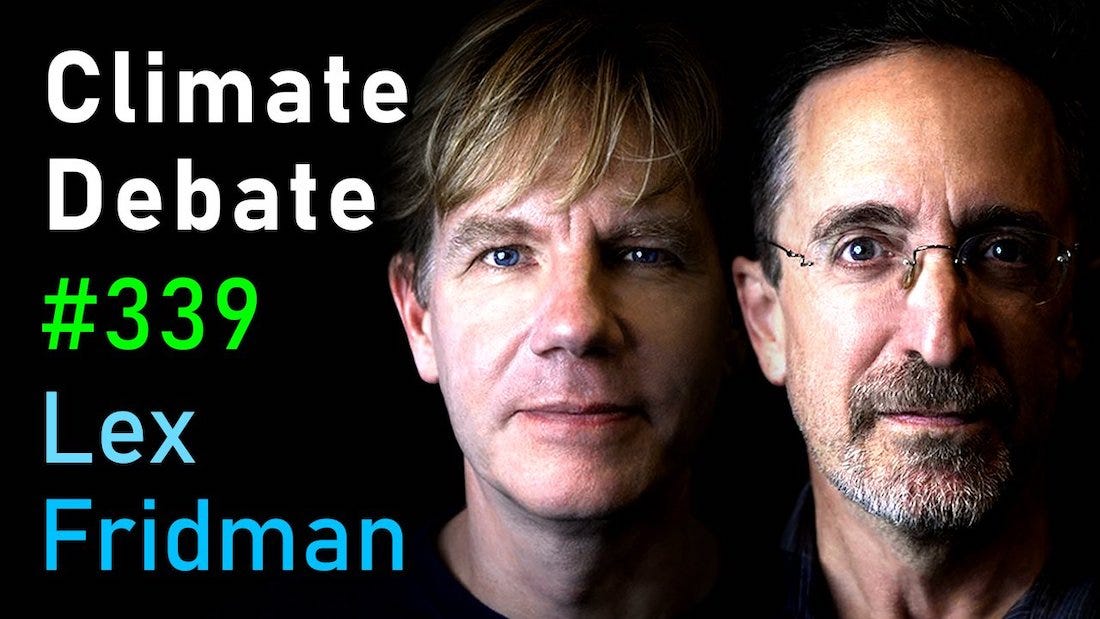
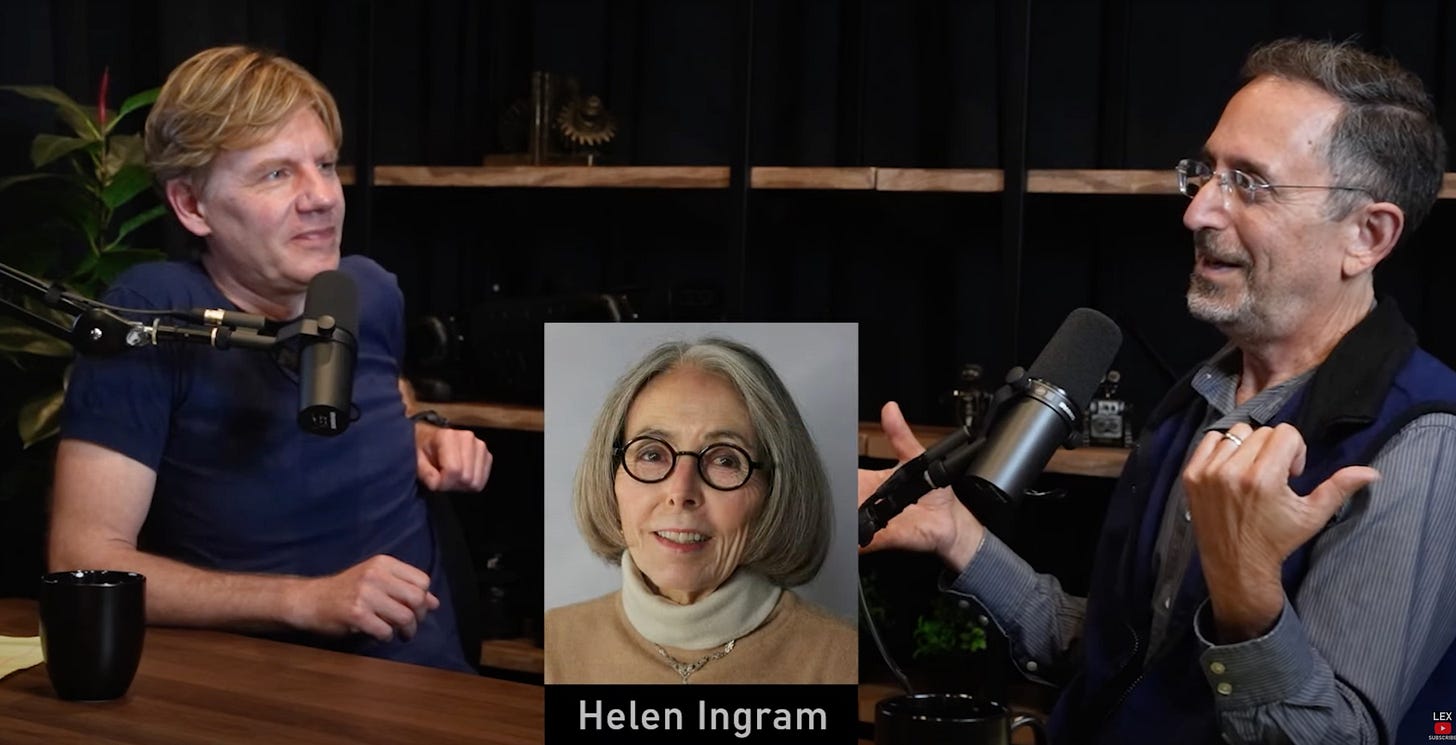
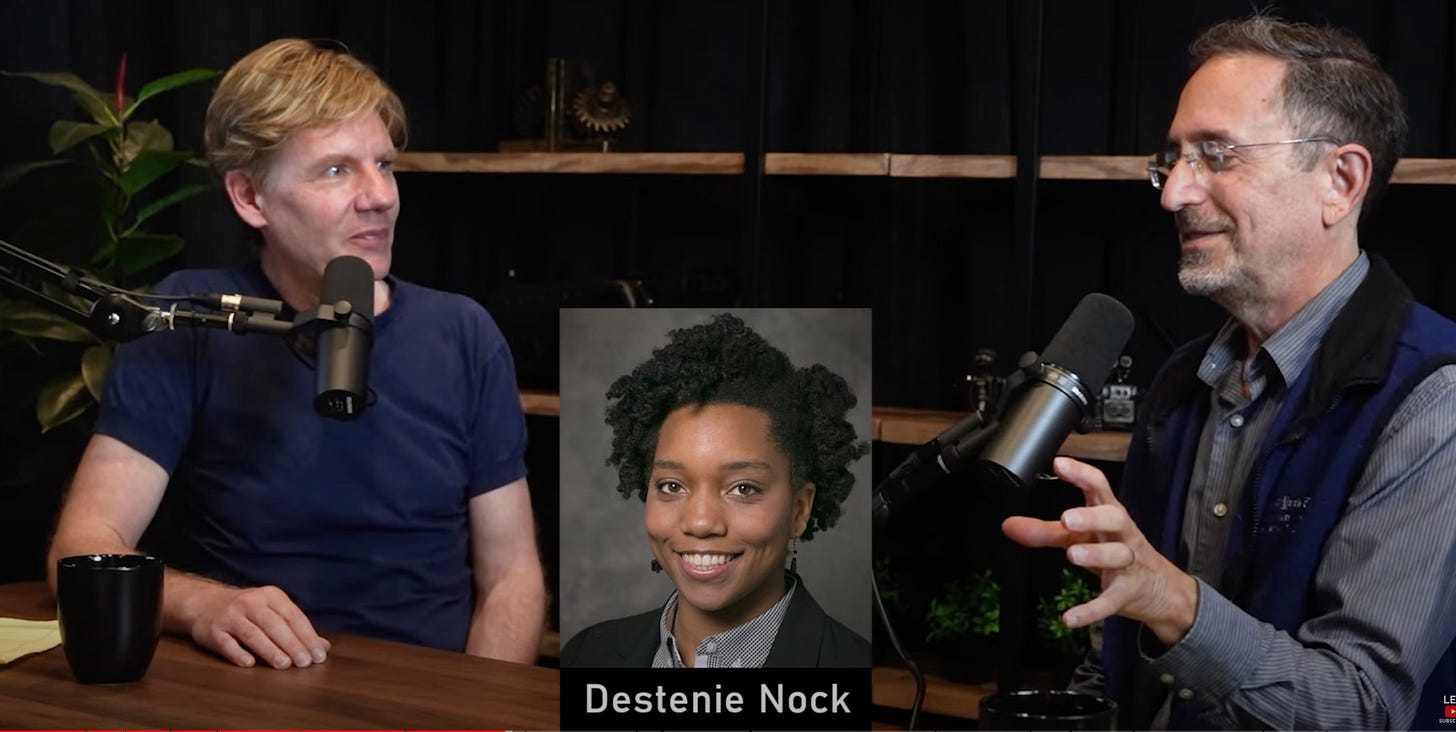
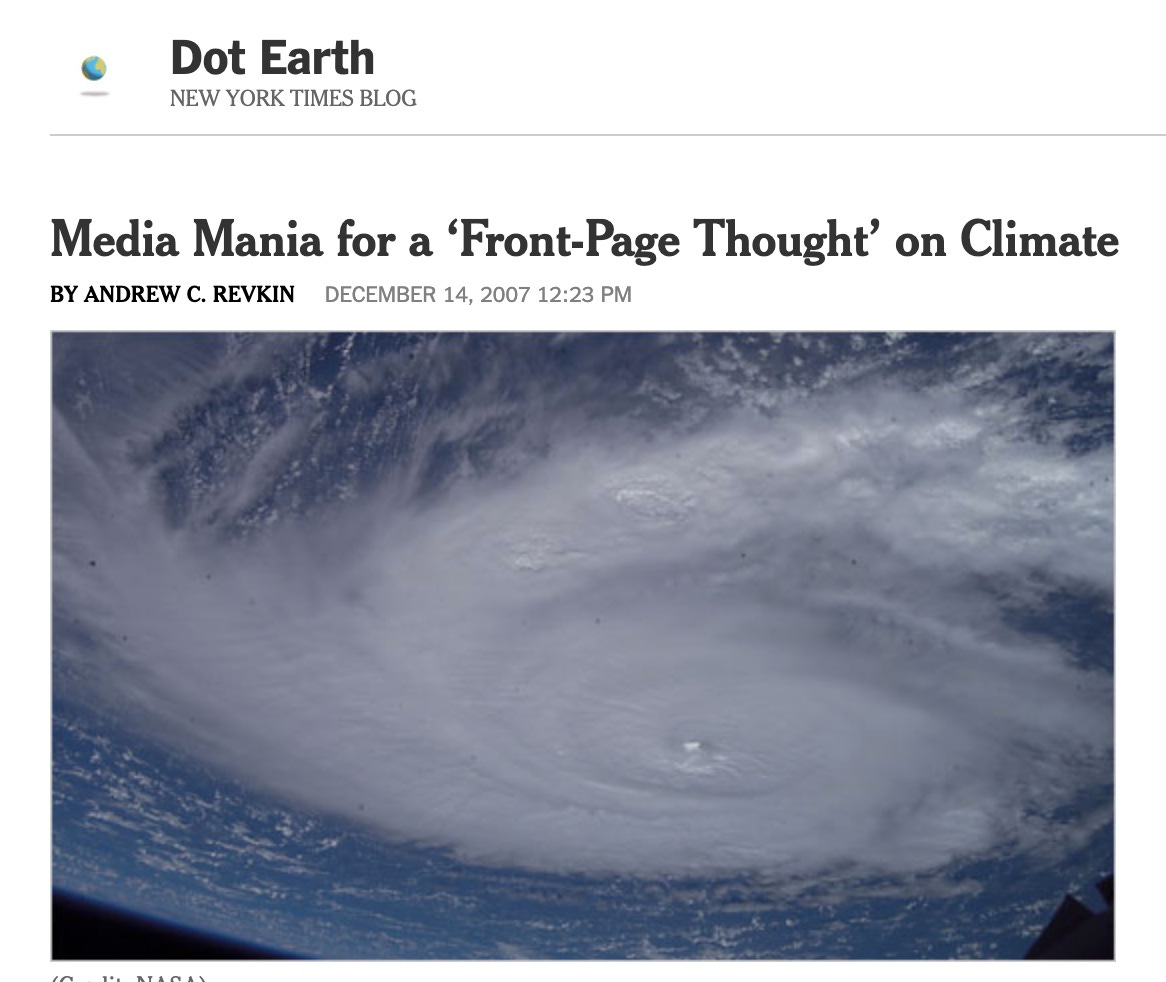
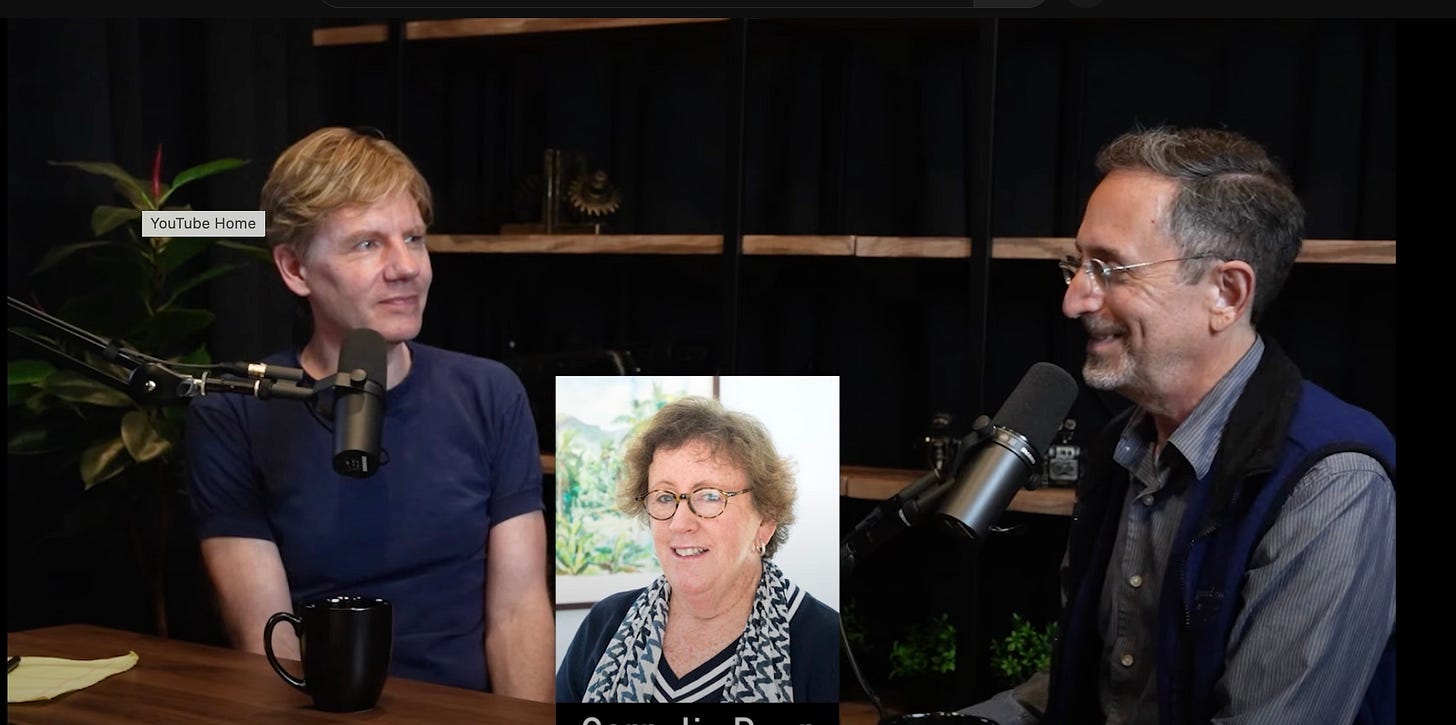
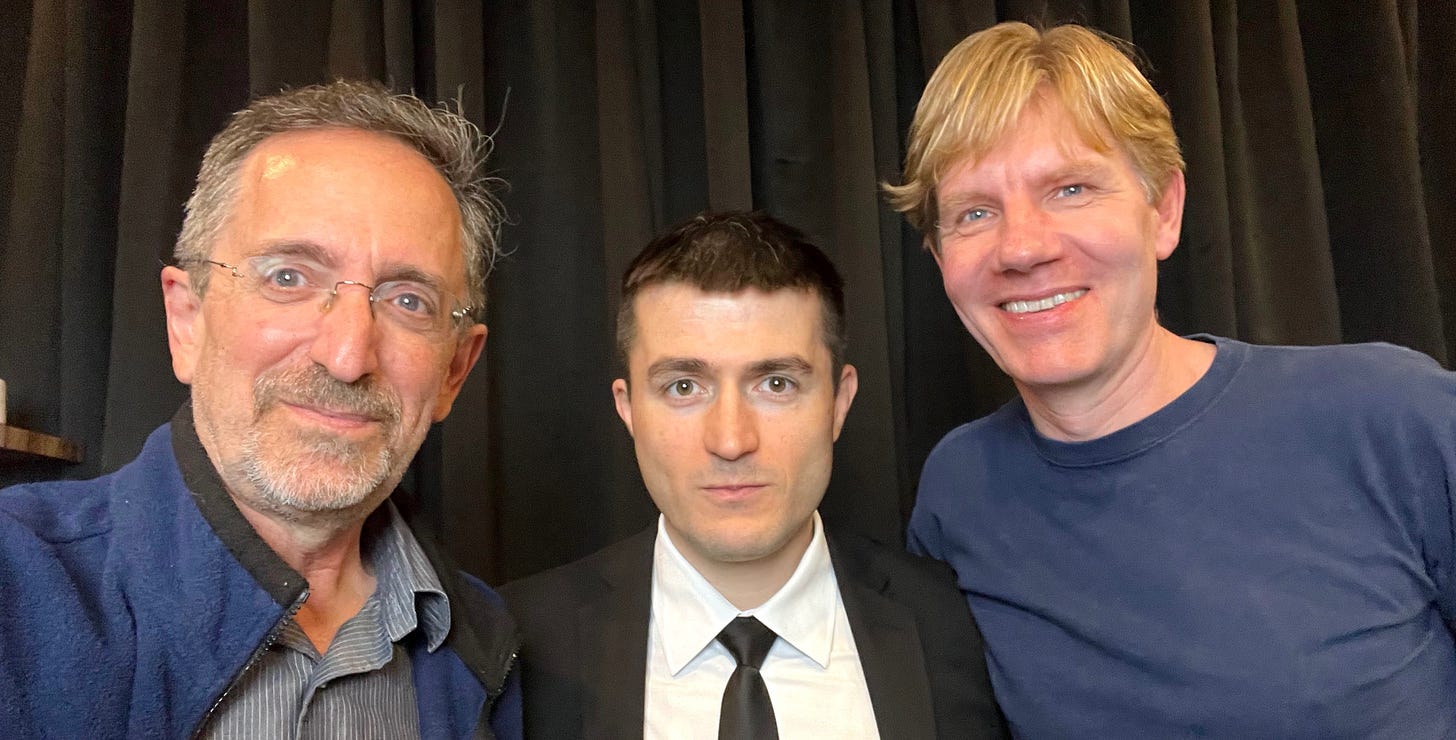
Great conversation and many great topics broached. Lex did a great job. The insights on what impact we are really having is sobering and weirdly encouraging given the damage a looming Republican Congress might seem like it could inflict. Probably less than we imagine. I think the big gap in the conversation and a gaping hole in the economic perspective Lomburg takes is the impact our actions have on the natural environment. While I think the point he made around time to improvement from fracking is fair, the fact that all of his cost benefit examples relate to the benefit to humans and ignores the billions of other living organisms on the planet that will also suffer consequences from global warming potentially including annihilation ignores value beyond calculation. If we just think about humans I think we will realise the doom he says is overstated . A planet without a flourishing natural environment will not be worth living on. We all need to bring that value to the fore and I know my children certainly feel that way . I don’t have confidence that the worlds technologists are going to be our saviours. After all, how much has been invested in cryptocurrencies and how positive is that. Personally I think we all need to question the ecological footprint we leave and we know some people have a far bigger footprint than others. Classic tragedy of the commons. And they mostly don't care. They are stealing our children’s future . Case in point : Elon Musk asking developers to fly to San Francisco for a code review for Christ's sake. Reducing consumption has to be a big part of the answer in a finite world.
Transatomic is no longer a going concern - since a few years ago. Your position on nuclear while not nearly the worst I've seen is pretty bad- there is no nuclear waste problem, there never has been... when you moved to your new place in Maine did you ask the real estate agent if the place had working waste management system, shower drain, garbage disposal? Probably not- you just assumed that. Now why don't you assume that the folks that designed nuclear power plants thought about waste management?
The nuclear fuel cycle is pretty simple: plants get fuel assemblies shipped in by truck on a regular basis (weekly), they inspect it very closely by hand, then every 18 months or so they put the fuel assemblies in the reactor, where they get hot for 3 years give or take- so here's where it gets slightly more complicated: that fuel is very radioactive now and mist be shielded - water is a perfect shield! So they take the top off the reactor and set that aside - at this point the fuel in the reactor is covered by what water is above it in the reactor vessel an you are looking at hot dangerous fuel - but perfectly safe with plenty of water between you and it. So how do they get the fuel up and out of the reactor? They flood the whole space 32 feet above the lip of the reactor- there is a channel or tube from the reactor containment to the long term cooling pool. The fuel assemblies are either carried upright through the deep channel, or laid down and rolled through a tube- to the cooling pool ( a deep water filled thick concrete holding tank- FOR 10 YEARS. Just sitting there under water- harmless (yes they circulate the water, no it's not a huge deal if those pumps go down) We've been dry cask storing spent fuel since the mid 80s- never been and incident of any kind. No one is interested in spent nuclear fuel. And globally we generate about 2500tons a year- care to guess how much coal ash we make? (hint we have over 1,500,000,000 tons of coal ash in North America alone. There is enough UF6 stacked up in Paducah KT to generate all of US electricity for 1000 years-- give or take. Carbon free. We can get uranium out of seawater. That stuff is everywhere. There are places in Canada where every other rock you trip over is mostly uranium...
After the fuel assemblies have cooled there for a decade - they go into dry casks outside where they take up valuable parking spaces until such time as someone wants to reprocess that fuel into new fuel of burn it in a fast reactor. At this point we don't reprocess fuel because it would be many times more expensive than just burning new fuel- nuclear fuel is cheap (about a 1/5 of what running a gas plant costs) (a gas plant might burn 20% of its capital cost per year... (a $2B plant- just estimating $500,000,000 in fuel costs alone- same in nuclear $75,000,000)
Your statement that wind and solar are growing was it explosively? is absurd- wind and solar don't keep up with increased demand, are grossly unreliable, expensive and hideously slow to deploy- oh I can hear it now "nuclear takes too long" - also just not true when compared to RE - sure gas is 1/4 the build time- and cheaper (money is such a poor metric when it comes to life on Earth though- but hey that's just me) Long term straight up accounting - 15 years down the road nukes are cash cows.
But we all know there is no straight up accounting when it come to nuclear (everything costs twice as much because of strangulating regulators that kill nuclear with fees (to wit a large portion of the $1.1B grant PG&E is getting to keep Diablo Canyon up and running will go straight back into the NRC- hundreds of millions of dollars in paper work which will amount to more than the cost of fueling that same plant. That is absurd.
No one ever mentions Price-Anderson. There's billions just sitting there.
Sorry to be so blunt Andrew but you need to, we need you to, up your game here and stand up for nuclear.
Emissions first, peace and justice will follow.